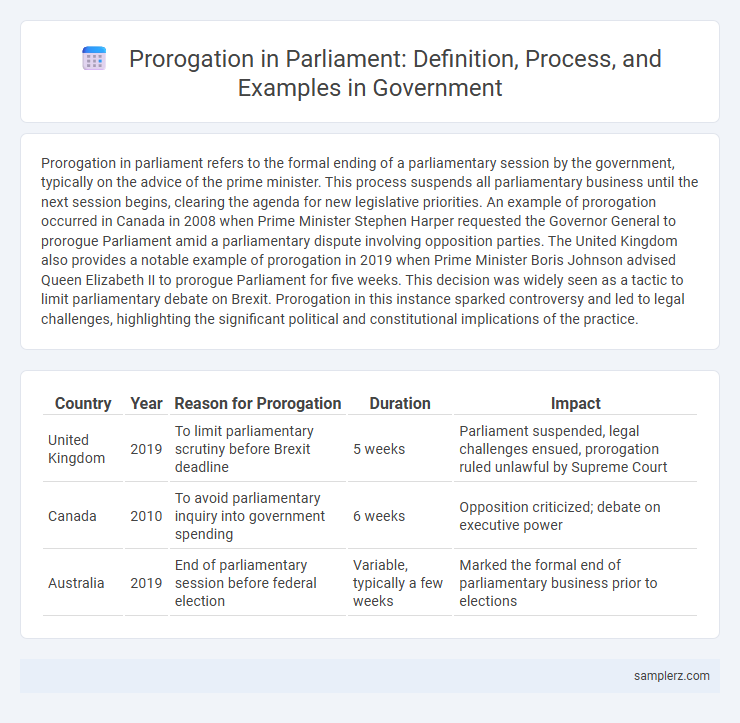Prorogation in parliament refers to the formal ending of a parliamentary session by the government, typically on the advice of the prime minister. This process suspends all parliamentary business until the next session begins, clearing the agenda for new legislative priorities. An example of prorogation occurred in Canada in 2008 when Prime Minister Stephen Harper requested the Governor General to prorogue Parliament amid a parliamentary dispute involving opposition parties. The United Kingdom also provides a notable example of prorogation in 2019 when Prime Minister Boris Johnson advised Queen Elizabeth II to prorogue Parliament for five weeks. This decision was widely seen as a tactic to limit parliamentary debate on Brexit. Prorogation in this instance sparked controversy and led to legal challenges, highlighting the significant political and constitutional implications of the practice.
Table of Comparison
| Country | Year | Reason for Prorogation | Duration | Impact |
|---|---|---|---|---|
| United Kingdom | 2019 | To limit parliamentary scrutiny before Brexit deadline | 5 weeks | Parliament suspended, legal challenges ensued, prorogation ruled unlawful by Supreme Court |
| Canada | 2010 | To avoid parliamentary inquiry into government spending | 6 weeks | Opposition criticized; debate on executive power |
| Australia | 2019 | End of parliamentary session before federal election | Variable, typically a few weeks | Marked the formal end of parliamentary business prior to elections |
Definition and Significance of Prorogation in Parliament
Prorogation in parliament refers to the formal ending of a parliamentary session by the head of state or their representative, effectively pausing all legislative activities until the next session begins. This process is significant as it allows the government to reset its agenda, manage legislative priorities, and avoid parliamentary deadlock without dissolving the legislature. Prorogation can also impact political strategy by delaying opposition scrutiny and influencing the timing of elections or policy announcements.
Historical Overview of Prorogation Practices
Prorogation in parliamentary history dates back to the early English Parliament, with King Charles I's controversial 1629 prorogation leading to an eleven-year period without parliamentary sessions, known as the Personal Rule. In modern times, the 2019 prorogation of the UK Parliament by Prime Minister Boris Johnson sparked legal challenges and was ruled unlawful by the UK Supreme Court, highlighting its constitutional limits. These instances underscore the evolving role of prorogation as both a routine parliamentary procedure and a tool with significant political implications.
Notable Examples of Prorogation in UK Parliament
In UK Parliament, notable examples of prorogation include the 2019 suspension by Prime Minister Boris Johnson, which was challenged in court and ruled unlawful by the Supreme Court, highlighting its constitutional limits. Another key instance occurred in 1948 when Queen Elizabeth II prorogued Parliament to end a session, showcasing the traditional ceremonial role monarchs play in parliamentary procedure. These cases illustrate prorogation's impact on legislative business and constitutional debates within the UK government system.
Prorogation in Parliamentary Democracies: Global Cases
Prorogation in parliamentary democracies is exemplified by the 2019 UK Parliament case, where Prime Minister Boris Johnson advised Queen Elizabeth II to prorogue Parliament, sparking debates over executive power and democratic accountability. In Canada, prorogation has been used strategically, such as in 2008 when Prime Minister Stephen Harper suspended Parliament to avoid a confidence vote, highlighting tensions between government control and legislative oversight. Australia also demonstrates prorogation practices, with the Governor-General proroguing sessions under prime ministerial advice to manage parliamentary schedules and political strategies.
Legal Framework Governing Prorogation
Prorogation in parliament is governed by constitutional laws and statutes such as the UK's Fixed-term Parliaments Act 2011 and relevant provisions in the Constitution Acts of other parliamentary democracies. Legal frameworks define the conditions under which the executive branch may advise the head of state to prorogue parliament, ensuring the suspension is limited and procedural. Judicial review occasionally interprets prorogation powers, reinforcing the balance between executive authority and parliamentary sovereignty.
Constitutional Impact of Prorogation Events
Prorogation in parliament, such as the 2019 UK case where Prime Minister Boris Johnson suspended Parliament, highlights significant constitutional impacts by limiting parliamentary scrutiny and debate on crucial legislation. This suspension raised questions about the balance of powers and the role of the judiciary in upholding constitutional norms, ultimately leading to the UK Supreme Court ruling the prorogation unlawful. Such events emphasize the delicate equilibrium between executive authority and parliamentary sovereignty within constitutional frameworks.
Political Controversies Surrounding Prorogation
The 2019 prorogation of the UK Parliament by Prime Minister Boris Johnson sparked significant political controversy, with critics accusing the move of undermining parliamentary democracy amid Brexit debates. The Supreme Court ultimately ruled the prorogation unlawful, emphasizing the constitutional limits on executive power. This case remains a pivotal example of the tension between government authority and parliamentary sovereignty in democratic systems.
Judicial Review of Prorogation Decisions
The 2019 UK Supreme Court ruling on the prorogation of Parliament established a pivotal precedent by declaring the Prime Minister's advice to the Queen unlawful due to its extreme length and impact on parliamentary scrutiny. This case underscored the judiciary's role in reviewing prorogation decisions, emphasizing that such executive actions are subject to legal limits and must not obstruct parliamentary sovereignty. Judicial review in prorogation cases ensures that democratic accountability is maintained by preventing governmental overreach during critical legislative periods.
Prorogation and its Effect on Legislative Agendas
Prorogation in parliament suspends sessions, halting all current legislative activities and effectively resetting the government's agenda. This pause disrupts the passage of bills, delaying policy implementation and often requiring a new session to prioritize or reintroduce legislation. The strategic use of prorogation can thus significantly influence the timing and success of a government's legislative program.
Lessons Learned from Past Prorogation Examples
The 2019 UK Parliament prorogation highlighted the importance of judicial review to maintain constitutional balance and prevent executive overreach. Lessons from this event emphasize the need for clear legal frameworks and parliamentary consensus to avoid undermining democratic processes. Governments must ensure prorogation is used judiciously to protect institutional integrity and public trust.

example of prorogation in parliament Infographic
 samplerz.com
samplerz.com